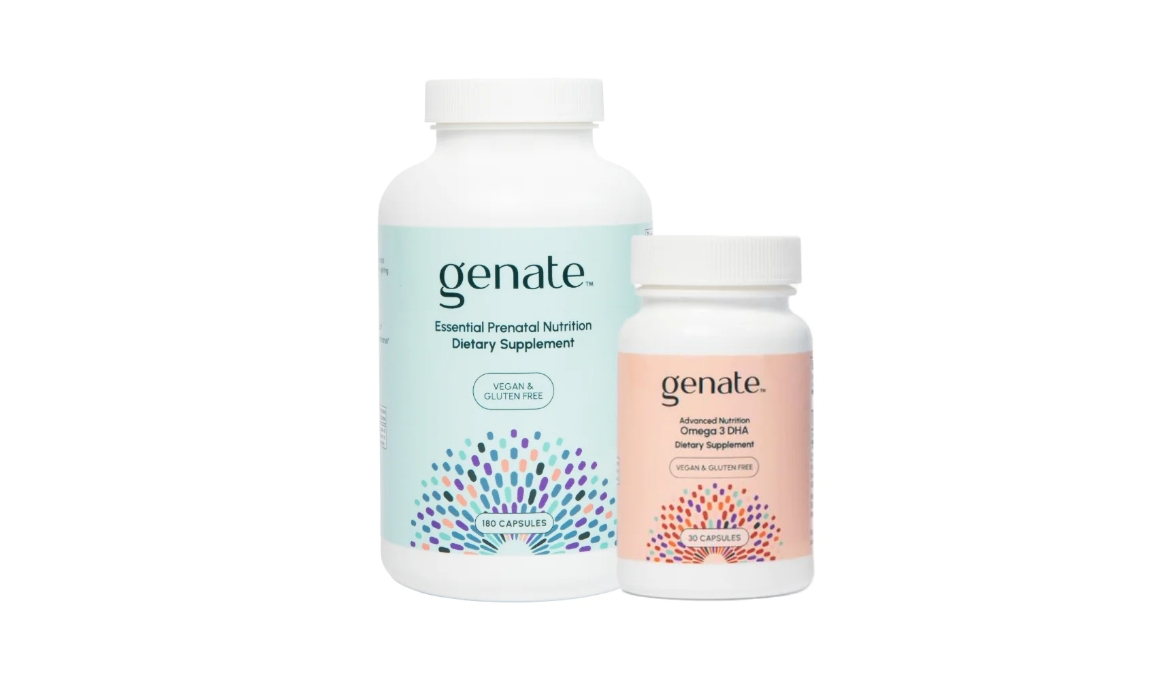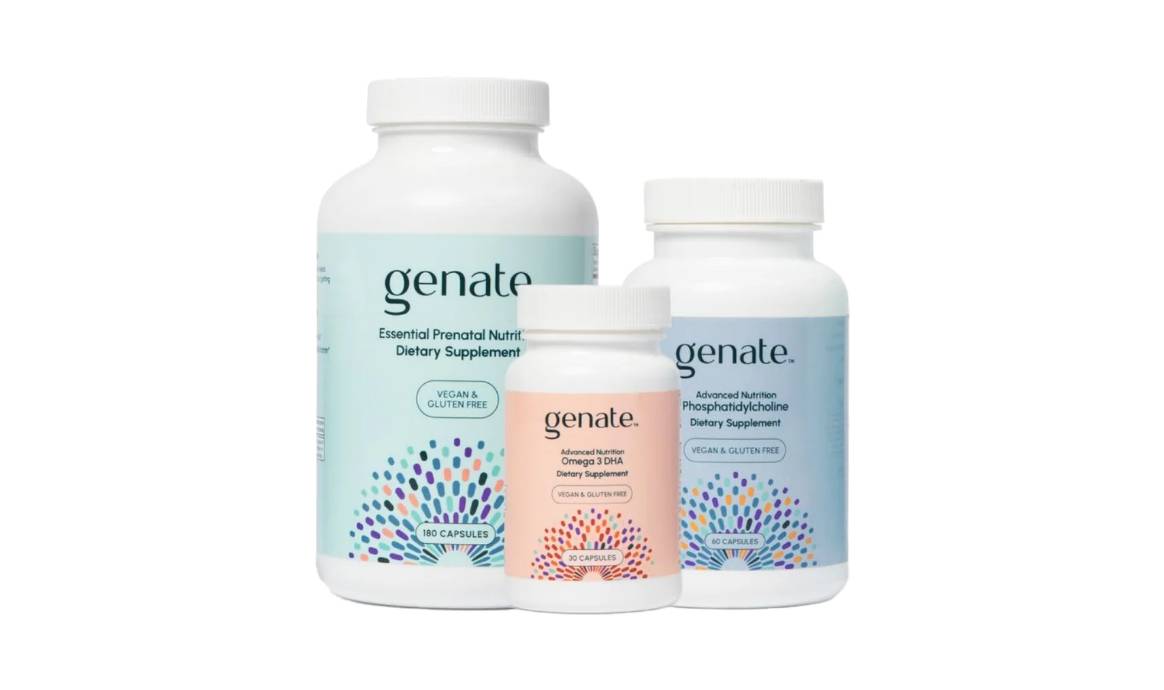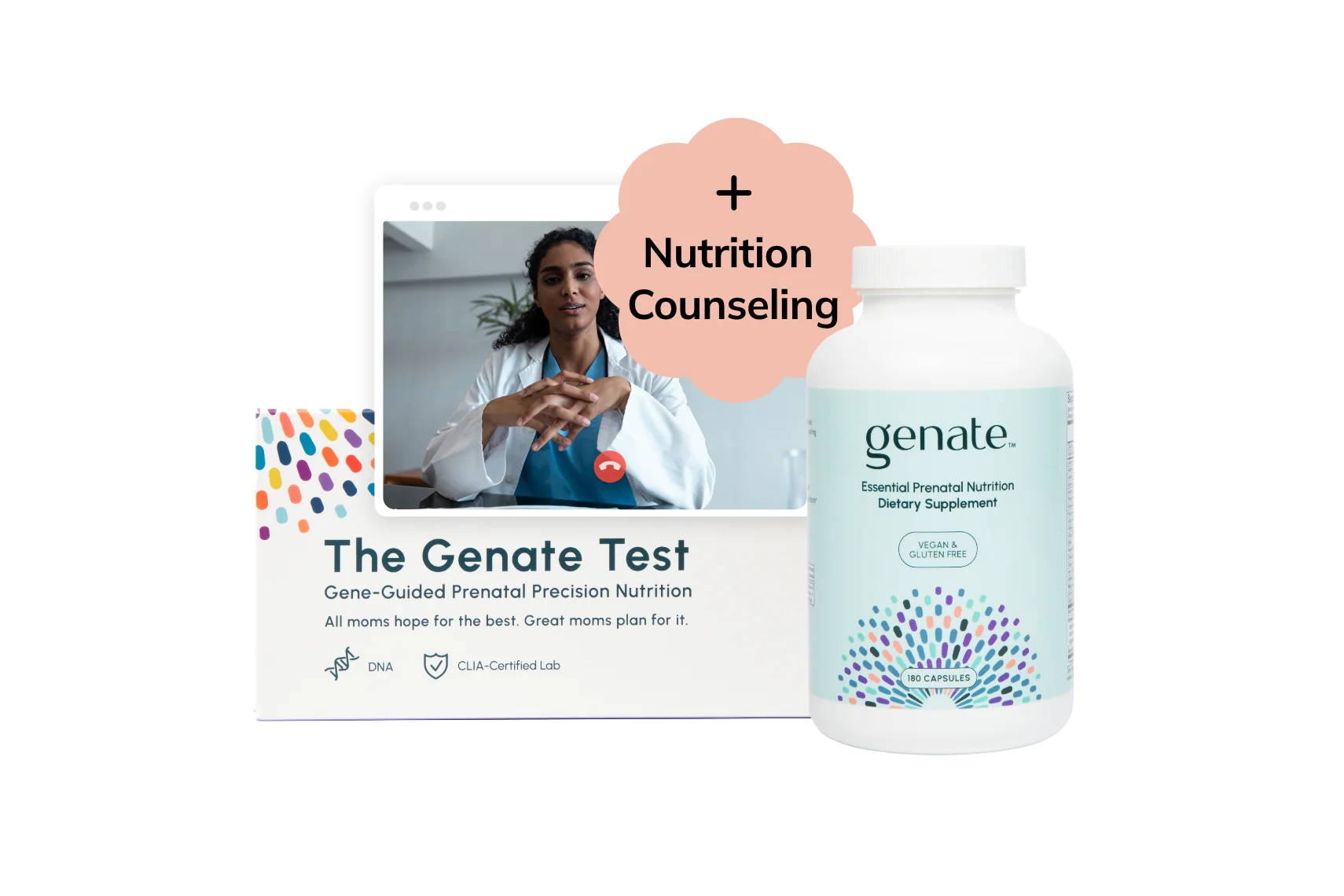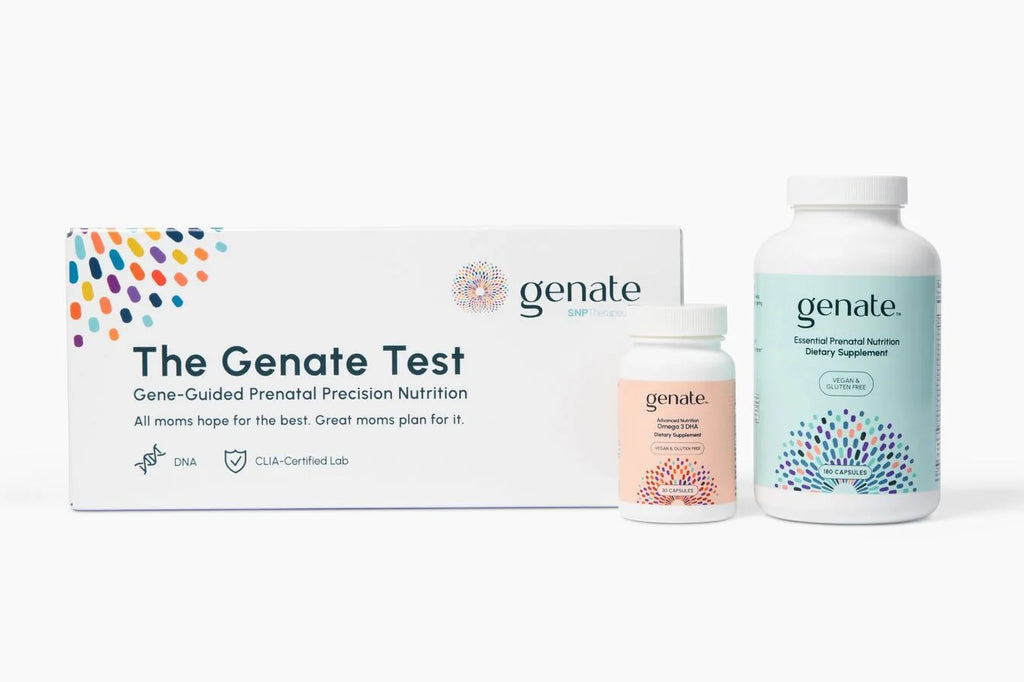Good nutrition is essential for every stage of your baby’s growth and development. But the efficiency with which your body metabolizes nutrients is partly determined by your genes, and common genetic variants can affect the metabolism of one-carbon nutrients that are critical for the development of your child’s brain and spinal cord. Genate Essential Prenatal Nutrition is a multivitamin formulated from academic research that provides women with a formulation optimized to support their baby’s cognitive development. It includes the one-carbon nutrients choline, betaine, methylfolate, and B vitamins that many women have trouble metabolizing and/or don’t get enough of in their diet.

PRENATALS
Genetic Insights into Prenatal Nutrition with Cara Everett on the Undefining Motherhood Podcast
May 10, 2024
The Role of Genetics in Prenatal Nutrition
In the realm of prenatal nutrition, a deep understanding of the intricate pathways of nutrients is indispensable for ensuring the optimal health of both mothers and their unborn babies. Genate’s nutrition counselor Cara Everett MS, RDN, LDN was recently featured on the Undefining Motherhood podcast to speak about the important role played by genetics in proper prenatal nutrition.
Discover the genetics that affect your baby's cognitive development
Key Nutrients for Maternal and Fetal Health
With her expertise and compassionate approach, Cara explains the roles of one-carbon nutrients in maternal and fetal health, shedding light on the nuances behind varying recommendations for essentials such as betaine and vitamin B12. Her insightful discourse not only emphasizes the significance of these nutrients during the critical first thousand days of life but also delves into the interplay between genetic variations and metabolic pathways.
Dietary Strategies for Optimal Prenatal Nutrition
This compelling conversation includes practical strategies and dietary suggestions, offering valuable insights into seamlessly incorporating vital nutrients like choline, DHA, and phosphatidylcholine into everyday meals.
Highlight Insights from Undefining Motherhood Podcast with SNP Therapeutics:
Q: Cara, can you talk to us a little bit about why, even though I'm seeing the inefficiencies and the methyl and choline pathways, we’re seeing such different recommendations for seemingly unrelated nutrients like betaine and vitamin B12?
A: It's critical to get enough one-carbon nutrients, including choline, in the first thousand days of life, which is the date of conception through the end of the second year of life. That's really when the brain forms all those neural connections and is developing for the most part. But then to get onto these other nutrients that you mentioned, betaine and folate and B12, the reason that you see increased needs for those could be twofold. One is that you have variants in the betaine pathway and/or in the folate pathway, and the folate pathway in particular needs B12 as a cofactor. So folate cannot do its job in DNA methylation unless there's enough B12. And there are certain variants that can affect your body's metabolism of B12. Betaine is actually produced from choline. So if we have a hard time producing choline, we're going to have a hard time producing enough betaine, but we can get betaine in supplement form and we can get it from foods. So you can supplement more to help your body out if that pathway has genetic inefficiencies in it. Betaine works very similarly to folate as a methyl donor or a one-carbon donor. That's why we call those one-carbon nutrients. And the donation of those methyl groups is really fundamental in DNA methylation, which controls gene expression, which controls pretty much everything in the body.
Q: Talk to us about some of the recommendations that you regularly find yourself making to your clients.
A: One of the supplements I recommend for pretty much all women in pregnancy is DHA, because it's very rare that I see someone eating salmon every day, or mackerel or sardines, and getting the DHA they need. And it is fundamental for brain and eye development as we know. So that is a very common one that I recommend. But then for a lot of women, they need more choline and or phosphatildylcholine as well. Sarah was a great example of that. Katie, you had variants in your choline pathways also.
Q: Yes, explain more to us there, because I found this fascinating.
A: Definitely. Phosphatidylcholine is a compound that your body can make via two pathways. One way is from choline. Another way is from another nutrient called phosphatidylethanolamine. You can also get phosphatidylcholine from food and supplements. But it's super important because it works in the liver to bind with fats and get them out of the liver through the bloodstream and into different organs where they're needed. One of those fats is DHA. So even if you're eating enough DHA, if your body is not making enough phosphatidylcholine, you can't get the DHA out of the liver and across your baby's blood brain barrier so that it can accumulate in the brain to help their brain develop.
Q: So what are the five foods every pregnant person needs? And how do we get choline in our diet?
A: I do have a list of the top five foods everyone should eat in pregnancy. There is a group of foods that are high in one-carbon nutrients, and we know that those are so fundamental in pregnancy that most women could stand to eat more of them, but we can work them into the diet in different ways. Some women are not going to eat some of them because they may be on a vegan diet or allergic to certain things. And so that's when we look at alternative food sources or supplementation if we need to. So the first food I would say that everyone needs due to its content of one carbon-nutrients is red meat. Beef liver in particular is the greatest source of choline. But I've not met a pregnant woman yet who is able to eat beef liver. I don't eat it myself. It's very strong. But other cuts of red meat are also high in choline. The next one would be salmon. It's a good source of choline. It's also a great source of DHA as we know. The third one is spinach. Spinach is very high in betaine. It's also high in folate. It also has calcium in it, which a lot of people don't realize. But for vegans, that's a great source of calcium. The fourth one would be eggs. Eggs are one of the best sources of choline. They tend to be, especially for many people in pregnancy, more palatable than red meat, not quite as strong and you can cook them in a number of different ways. One egg has 150 milligrams of choline, so if you're eating two eggs a day, that's 300 milligrams. And then the last one that a lot of people are already eating is whole grains. So that would include any kind of wheat products, quinoa, buckwheat, any type of whole grains. They are generally all really good sources of betaine, which again is in the one-carbon nutrient pathways needed for methylation. So that would be a good starting point for everyone to think about.
Q: What do you do to try and work in some of these things in ways that are going to be palatable, interesting, and unique?
A: I recommend trying to eat foods that are cold or room temperature instead of hot. So maybe salmon on a salad is easier than a hot piece of cooked salmon. That's sometimes tolerated more easily. If you have nausea, then the temperature can make a big difference. Another thing that’s helpful is having five small meals a day instead of trying to eat three large meals. And if breakfast is a hard time a day for you to eat, just skip it. You could even do a smoothie for lunch. That can be a full meal depending on what you put in it. I know Katie, you and I have talked about protein powder, and we are actually working on a powdered form of our prenatal. Incorporating that into a smoothie can be a much easier way to get it down and still get the nutrients you need. If you're taking a good comprehensive prenatal like Genate, you can get those nutrients throughout the day. That may be in a powder form or maybe you take three or four doses over the course of the day. Smaller doses can be easier to tolerate and also help increase nutrient absorption.
This article is not intended as medical advice to treat or diagnose any health condition but rather as educational health information for the general public. It should not be used as a substitute for individualized medical care from your healthcare provider.
Shop the Article
Save 23% today!
Genate Essential Prenatal Multivitamin + Advanced Omega-3 DHA Package
Bundle to increase savings and provide the foundational nutrients needed for optimal health and development.
From $72 per month
Save 23% today!
Comprehensive Prenatal Support Package
Genate Essential Prenatal Multivitamin + Advanced Omega-3 DHA + Phosphatidylcholine
Our most comprehensive bundle - you’ll receive our Essential Prenatal Multivitamin, Advanced Phosphatidylcholine, and Advanced Omega-3 DHA.
From $110 per month
Save 30% today!
Comprehensive Prenatal Nutrition Bundle
Buy the Genate Test and a nutrition counseling session with a Genate registered dietitian, and receive a 30-day supply of the Genate Essential Prenatal Multivitamin FREE. Purchase includes a 90-day prenatal multivitamin subscription at our best monthly price.
$309
Take the Genate Quiz
Take our Nutrition Quiz to learn more about your nutrition journey.
Read Our Latest Articles
Frequently Asked Questions
What are the benefits of my baby getting the proper nutrients?
What are one-carbon nutrients and fatty acids, and why are they important?
One-carbon nutrients and fatty acids are critical for brain and spinal cord development during pregnancy and through the first two years of life. Although all nutrients are important, the one-carbon nutrients choline, folate, betaine, and B vitamins, along with the omega-3 fat DHA, provide the building blocks for proper growth of your developing baby's brain. Research at Cornell and Harvard universities has shown cognitive benefits for children born to mothers who received increased levels of one-carbon nutrients during pregnancy, demonstrating that optimal nutrition during pregnancy can have lasting effects for your baby.
If I buy Genate nutrition supplements, do I still need to take the test?
Genetic testing is a personal choice, and only you can decide what’s best for you and your baby. But the Genate Test is a powerful tool for optimizing your nutrition status, as it identifies genetically-caused metabolic inefficiencies that may influence your body’ ability to make and use the nutrients critical for your baby’s cognitive development. If you have SNPs in any of the nutrient pathways tested, your Genate Report will provide personalized recommendations for optimizing your nutrition. Our registered dietitians can show you how to fill in the gaps with foods and supplementation, if needed, to make sure you’re getting the nutrition you and your baby need.








